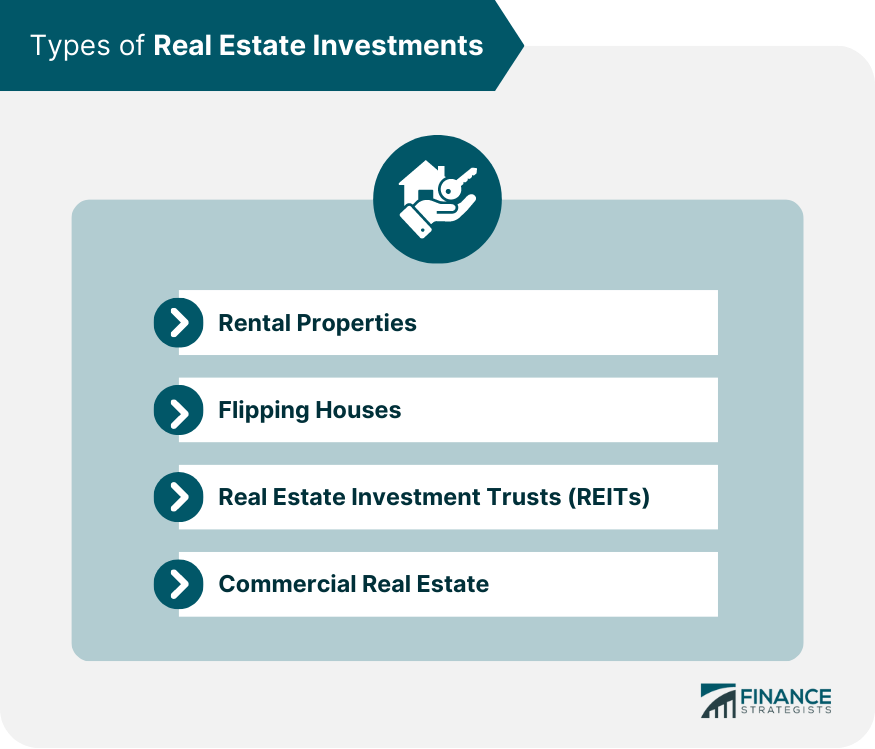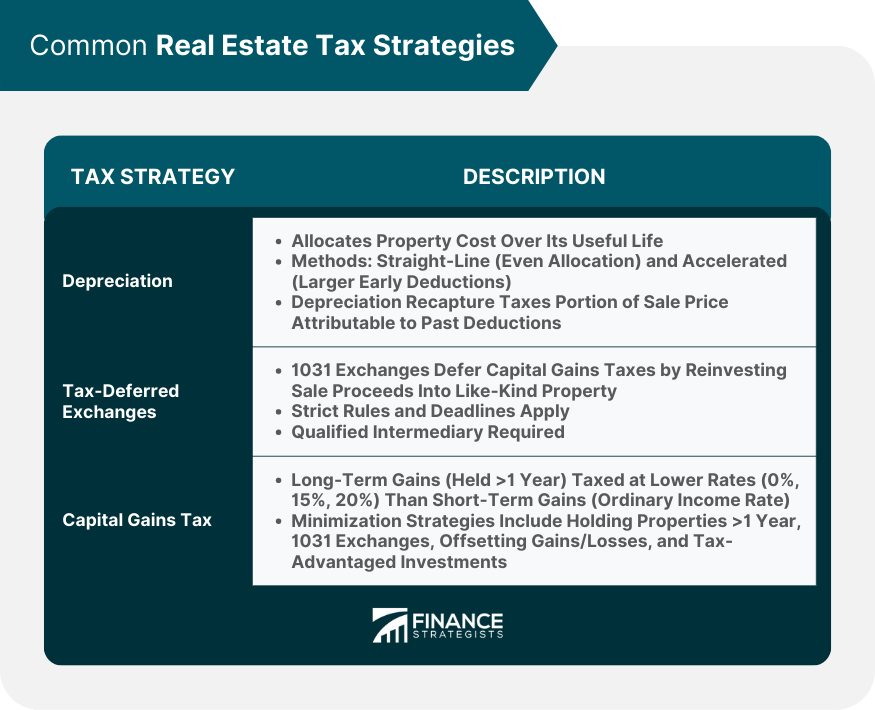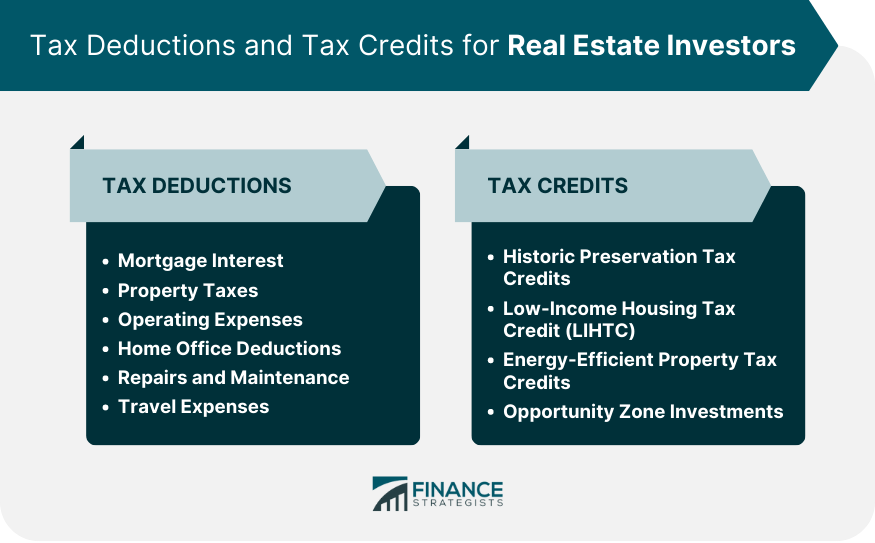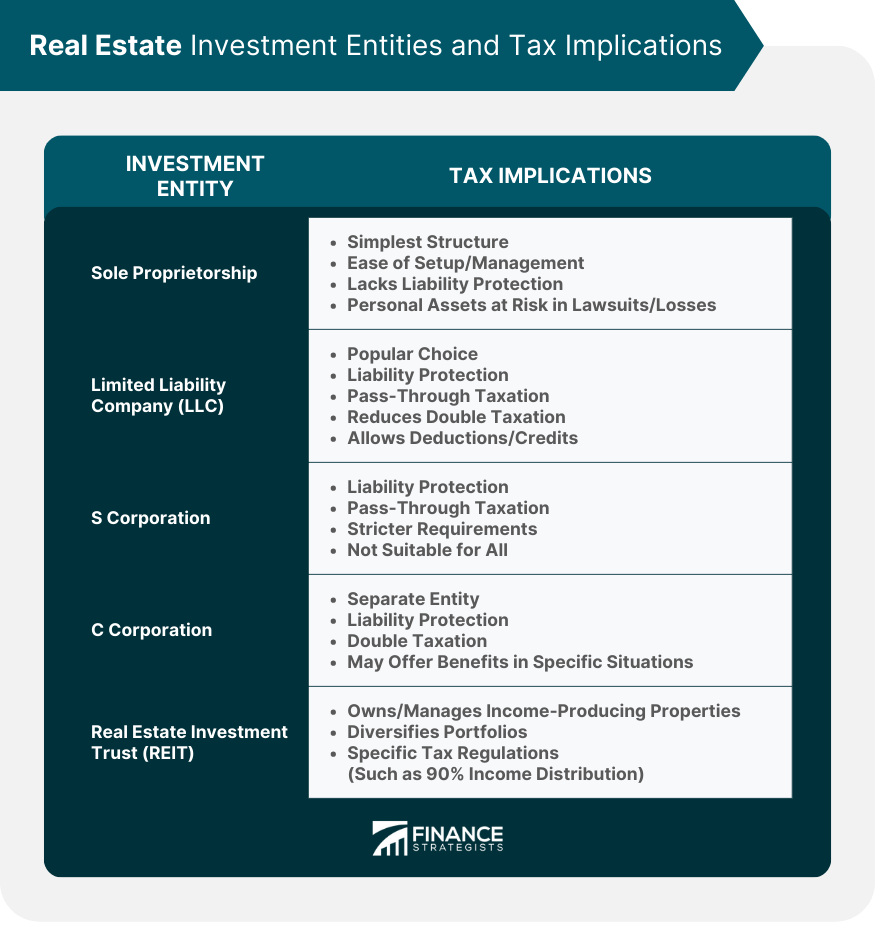Real estate tax strategies are techniques used by investors to reduce their tax liability on real estate investments. Effective tax planning is vital for property investors as it can impact the profitability of their investments. By using real estate tax strategies, investors can improve their returns, cash flow, and long-term financial growth while ensuring compliance with tax regulations. The goals of these strategies are to minimize tax liability, maximize deductions and credits, preserve capital gains, and achieve financial objectives. By employing real estate tax strategies, investors can optimize their investments and achieve their financial goals. Rental properties are residential or commercial properties that investors purchase with the intent of renting them out to tenants. This type of investment generates income through rental payments, which can offset the property's expenses and provide a steady cash flow. Flipping houses involves purchasing a property, making improvements or renovations, and then selling it for a profit. This strategy relies on the investor's ability to quickly add value to the property and sell it at a higher price, generating short-term capital gains. Real Estate Investment Trusts (REITs) are companies that own and manage income-producing real estate properties, allowing investors to buy shares in these companies. By investing in a REIT, investors can diversify their portfolio and gain exposure to the real estate market without directly owning property. Commercial real estate encompasses properties used for business purposes, such as office buildings, retail centers, and industrial properties. Investing in commercial real estate can offer higher returns and longer lease terms compared to residential properties, but may require more capital and expertise. Depreciation is the process of allocating the cost of tangible property over its useful life. For tax purposes, investors can deduct a portion of the property's cost each year, lowering their taxable income and providing a significant tax benefit. There are two primary methods of calculating depreciation for real estate investments: straight-line depreciation and accelerated depreciation. Straight-line depreciation spreads the cost evenly over the property's useful life, while accelerated depreciation allows for larger deductions in the earlier years. Depreciation recapture is the process of taxing the portion of the property's sale price attributable to the depreciation deductions previously taken. It aims to recoup some of the tax benefits received by the investor during the property's holding period. A 1031 exchange, also known as a tax-deferred exchange, allows investors to defer paying capital gains taxes on the sale of an investment property by reinvesting the proceeds into another like-kind property. This strategy helps investors preserve their capital and continue to grow their portfolios. To qualify for a 1031 exchange, the properties involved must be like-kind, meaning they are of the same nature or character. Typically, this includes investment or business properties, such as rental properties, commercial properties, or land held for investment. There are strict rules and deadlines for completing a 1031 exchange. Investors must identify potential replacement properties within 45 days of the sale and close on the new property within 180 days. Additionally, a qualified intermediary must facilitate the exchange to ensure compliance. Long-term capital gains are realized from the sale of an investment property held for more than one year, while short-term capital gains result from the sale of a property held for one year or less. Long-term gains are generally taxed at a lower rate than short-term gains, making them more favorable for investors. Capital gains tax rates vary depending on the investor's income level and the duration of the investment. Long-term capital gains are taxed at 0%, 15%, or 20%, depending on the investor's tax bracket, while short-term capital gains are taxed at the individual's ordinary income tax rate. Investors can minimize capital gains tax by holding properties for more than one year. They can make use of tax-deferred exchanges (1031 exchanges), offsetting gains with losses, and investing in tax-advantaged accounts or strategies such as Opportunity Zones or Qualified Small Business Stock (QSBS). Mortgage interest is a tax-deductible expense for real estate investors. By deducting the interest paid on a mortgage, investors can reduce their taxable income, which in turn decreases their overall tax liability. Property taxes paid on investment properties are generally deductible for income tax purposes. Investors can deduct these taxes to help offset rental income, further lowering their taxable income. Operating expenses, such as insurance, utilities, and property management fees, are deductible for tax purposes. These deductions help reduce the investor's taxable income and can result in significant tax savings. Real estate investors who use a portion of their home for business purposes may qualify for home office deductions. This deduction can cover a portion of expenses like mortgage interest, utilities, and property taxes, further reducing the investor's tax liability. Repairs and maintenance expenses incurred to keep a rental property in good condition are tax-deductible. These deductions help offset rental income and lower the investor's taxable income. Investors can deduct travel expenses related to their real estate investments, such as driving to and from rental properties or attending industry conferences. This deduction can help reduce the investor's overall tax burden. Historic preservation tax credits provide an incentive for investors to rehabilitate historic properties. Investors can receive a federal tax credit of up to 20% of the rehabilitation costs, which can offset their tax liability. The LIHTC program offers tax credits to investors who develop affordable housing projects. By investing in LIHTC projects, investors can receive dollar-for-dollar reductions in their federal income tax liability, promoting the development of affordable housing. Energy-efficient property tax credits are available for investors who make energy-efficient improvements to their properties. These credits can help offset the cost of improvements, such as installing solar panels or energy-efficient windows, while reducing the investor's tax liability. Opportunity Zones are designated economically distressed areas where investors can receive tax benefits for investing in qualified projects. By investing in Opportunity Zone projects, investors can defer or eliminate capital gains taxes, promoting economic development in these areas. A sole proprietorship is the simplest business structure for real estate investors. While it offers ease of setup and management, it does not provide liability protection, and the investor's personal assets may be at risk in the event of a lawsuit or financial loss. An Limited Liability Company (LLC) is a popular choice for real estate investors because it provides liability protection and pass-through taxation, meaning the profits and losses flow directly to the owners' personal tax returns. This structure helps reduce double taxation and allows investors to take advantage of available deductions and credits. An S Corporation is another option for real estate investors that provides liability protection and pass-through taxation. However, it has stricter requirements than an LLC, such as limitations on the number and type of shareholders, and may not be the best choice for all investors. A C Corporation is a separate legal entity that provides liability protection but is subject to double taxation, as the corporation and its shareholders are taxed on profits. While it may not be the most tax-efficient choice for most real estate investors, it can offer benefits in specific situations. A Real Estate Investment Trust is a company that owns and manages income-producing real estate properties. Investing in a REIT allows investors to diversify their portfolios and gain exposure to the real estate market without directly owning property. REITs are subject to specific tax regulations, including distributing at least 90% of their taxable income to shareholders. Proper record-keeping is essential for real estate investors to track income, expenses, and deductions accurately. Maintaining accurate records ensures that investors can take full advantage of available tax benefits and minimize the risk of tax audits or penalties. Engaging in tax planning and consulting with tax professionals, such as CPAs or tax attorneys, can help real estate investors develop effective strategies to minimize their tax liability. Professionals can provide guidance on complex tax issues, help investors stay compliant, and identify opportunities for tax savings. Real estate tax laws and regulations can change frequently, making it crucial for investors to stay informed. Keeping up with these changes ensures that investors can adjust their strategies to maximize tax benefits and maintain compliance with current laws. Real estate tax strategies are essential for investors to reduce their tax liability on real estate investments. By minimizing tax liability, maximizing deductions and credits, preserving capital gains, and achieving financial objectives, investors can optimize their investments and achieve their financial goals. Depreciation, 1031 exchanges, and holding properties for more than a year are common strategies used by real estate investors to minimize their tax liability. Tax deductions and tax credits, such as mortgage interest, property taxes, and energy-efficient property tax credits, can also help reduce taxable income. Selecting the right real estate investment entity, staying up to date with tax laws and regulations, and proper record-keeping are crucial for investors to maximize tax benefits and maintain compliance. Engaging in tax planning and consulting with tax professionals can also help investors develop effective strategies and identify opportunities for tax savings.What Are Real Estate Tax Strategies?
Types of Real Estate Investments

Rental Properties
Flipping Houses
Real Estate Investment Trusts (REITs)
Commercial Real Estate
Common Real Estate Tax Strategies
Depreciation
Tax-Deferred Exchanges (1031 Exchanges)
Capital Gains Tax Strategies

Tax Deductions for Real Estate Investors
Mortgage Interest
Property Taxes
Operating Expenses
Home Office Deductions
Repairs and Maintenance
Travel Expenses
Tax Credits for Real Estate Investors
Historic Preservation Tax Credits
Low-Income Housing Tax Credit (LIHTC)
Energy-Efficient Property Tax Credits
Opportunity Zone Investments

Real Estate Investment Entities and Tax Implications
Sole Proprietorship
Limited Liability Company (LLC)
S Corporation
C Corporation
Real Estate Investment Trust (REIT)

Tax Planning and Record Keeping
Importance of Proper Record Keeping
Tax Planning and Consultation with Professionals
Staying Up to Date with Tax Laws and Regulations
Final Thoughts
Real Estate Tax Strategies FAQs
Common real estate tax strategies include utilizing depreciation, engaging in tax-deferred exchanges (1031 exchanges), minimizing capital gains tax, and taking advantage of various deductions and credits available to investors.
Real estate tax strategies help investors minimize their tax liability, maximize deductions and credits, preserve capital gains, and ensure compliance with tax laws and regulations. By implementing these strategies, investors can optimize their investments and achieve their financial goals.
Different real estate investment types, such as rental properties, flipping houses, commercial real estate, and REITs, have unique tax implications that affect the tax strategies available to investors. Understanding these implications is crucial for selecting the most appropriate and effective tax strategies.
Staying up-to-date with real estate tax strategies and regulations helps investors identify opportunities for tax savings, adjust their strategies as needed, and maintain compliance with current laws. This proactive approach ensures that investors can maximize tax benefits and minimize potential risks.
Professional tax planning services can help investors develop and implement effective real estate tax strategies by providing guidance on complex tax issues, identifying opportunities for tax savings, and ensuring compliance with ever-changing tax laws. By seeking these services, investors can maximize their real estate investment returns and achieve their financial goals.
True Tamplin is a published author, public speaker, CEO of UpDigital, and founder of Finance Strategists.
True is a Certified Educator in Personal Finance (CEPF®), author of The Handy Financial Ratios Guide, a member of the Society for Advancing Business Editing and Writing, contributes to his financial education site, Finance Strategists, and has spoken to various financial communities such as the CFA Institute, as well as university students like his Alma mater, Biola University, where he received a bachelor of science in business and data analytics.
To learn more about True, visit his personal website or view his author profiles on Amazon, Nasdaq and Forbes.















